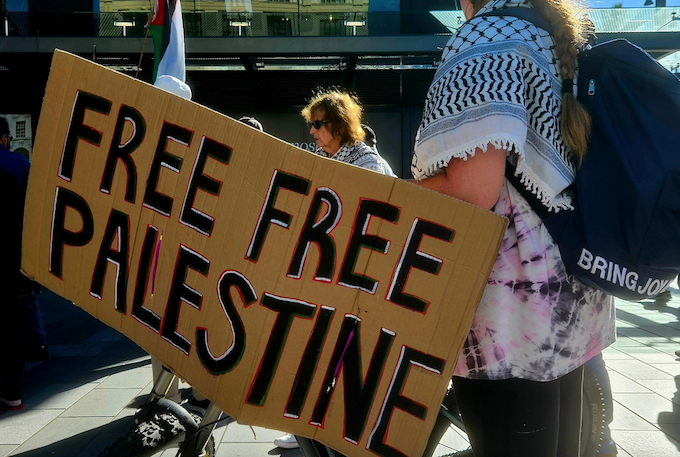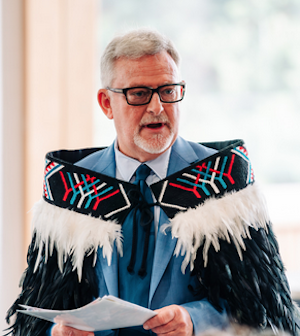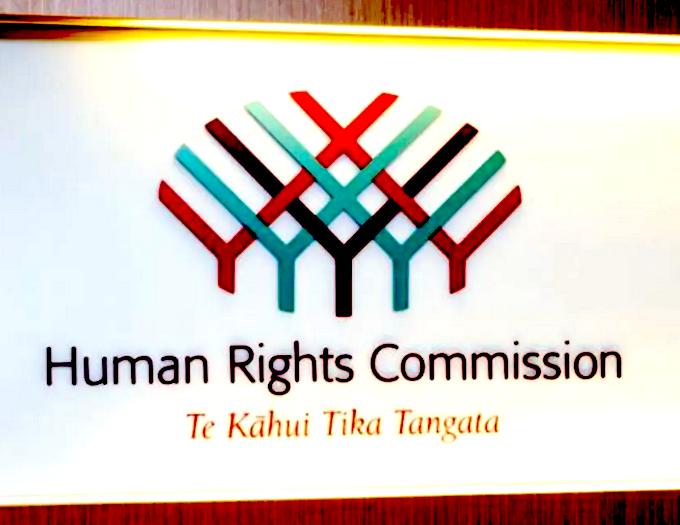
COMMENTARY: By Katrina Mitchell-Kouttab
“Wherever Palestinians have control is barbaric.” These were the words from New Zealand’s Chief Human Rights Commissioner Stephen Rainbow.
During a meeting with Philippa Yasbek from Jewish Voices for Peace, Dr Rainbow allegedly told her that information from the NZ Security Intelligence Services (NZSIS) threat assessment asserted that Muslims were the biggest threat to the Jewish community. More so than white supremacists.
But the NZSIS has not identified Muslims as the greatest threat to national security.
- READ MORE: Stoush breaks out between NZ Human Rights Commissioner and Jewish leader at Parliament
- Baptist Church condemns ‘appalling’ Israeli Palm Sunday attack on hospital
- New chief Human Rights Commissioner Stephen Rainbow’s pro-Israel Facebook posts, ‘transphobia’ accusations
- Other articles by Katrina Mitchell-Kouttab at Asia Pacific Report
In the 2023 threat environment report, NZSIS stated that it: “Does not single out any community as a threat to our country, and to do so would be a misinterpretation of the analysis.
“White Identity-Motivated Violent Extremism (W-IMVE) continues to be the dominant IMVE ideology in New Zealand. Young people becoming involved in W-IMVE is a growing trend.”
Religiously motivated violent extremism (RMVE) did not come from the Muslim community, as Dr Rainbow has also misrepresented.
The more recent 2024 NZSIS report stated: “White identity-motivated violent extremism (W-IMVE) remains the dominant IMVE ideology in New Zealand. Terrorist attack-related material and propaganda, including the Christchurch terrorist’s manifesto and livestream footage, continue to be shared among IMVE adherents in New Zealand and abroad.”
To implicate Muslims as being the greatest threat may highlight Dr Rainbow’s own biases, racist beliefs, and political agenda. These false narratives, that have recently been strongly pushed by the US and Israel, undermine social cohesion and lead to a rise in Islamophobia and anti-Palestinian racism.
It is also deeply troubling that he has framed Muslim and Arab communities as potential sources of violent extremism while failing to acknowledge the very real and documented threats they have faced in Aotearoa.
The Christchurch Mosque attacks — the most horrific act of mass violence in New Zealand’s modern history — were perpetrated not by Muslims, but against them, by an individual radicalised by white supremacist ideology.

Since that tragedy, there have been multiple threats made against mosques, Arab New Zealanders, and Palestinian communities, many of which have received insufficient public attention or institutional response.
For a Human Rights Commissioner to overlook this context and effectively invert the victim-aggressor dynamic is not only factually inaccurate, but it also risks reinforcing harmful stereotypes and undermining the safety and dignity of communities who are already vulnerable.
Such narratives are inconsistent with the Human Rights Commission’s mandate to protect all people in New Zealand from discrimination and hate.
The dehumanisation of Muslims and Palestinians
As part of Israel’s propaganda, anti-Muslim and Palestinian tropes are used to justify violence against Palestinians by framing us as barbaric, aggressive, and as a threat. We are dehumanised in order to normalise the harm they inflict on our communities which includes genocide, land theft, ethnic cleansing, apartheid policies, dispossession, and occupation.
In October 2023, Dan Gillerman, a former Israeli Ambassador to the UN, described Palestinians as “horrible, inhuman animals” and was perplexed with the growing global concern for us.
That same month Yoav Gallant, then Israeli Defence Minister, referred to Palestinians as “human animals” when he announced Israel’s illegal and horrific siege on Gaza that included blocking water, food, medicine, and shelter to an entire population, the majority of which are children.
In making his own remarks about the Muslim community being a “threat” in New Zealand as a collective group, and labelling Palestinians being “barbaric”, Dr Stephen Rainbow has shattered the credibility of the Human Rights Commission. He has made it very clear that he is not impartial nor is he representing and protecting all communities.
Instead, Dr Rainbow is exacerbating divisions within society. This is a worrying trend that we are witnessing around the world; the de-humanising of groups to serve political agendas, retain power, or seek public support for war crimes and crimes against humanity.
Dr Rainbow’s appointment also points a spotlight onto this government’s commitment to neutrality and inclusiveness in its human rights policies. Allowing a high-ranking official to make discriminatory remarks undermines New Zealand’s commitment to the International Convention on the Elimination of All Forms of Racial Discrimination (ICERD) and the Universal Declaration of Human Rights.
A high-ranking official should not be allowed to engage in Islamic and Palestinian racist rhetoric without consequence. The public should be questioning the morals, principles, and inclusivity of those currently in power. Our trust is being eroded.
Dr Stephen Rainbow’s comments can also be seen as a breach of human rights principles, as he is supposed to uphold equality and non-discrimination. Yet his beliefs seem to be peppered with racism, often falsely based on religion, ethnicity, and race.
Foreign influence in New Zealand
This incident also shines accountability and concerns for foreign influence and propaganda seeping into New Zealand. The Israel Institute of New Zealand (IINZ) has published articles that some perceive as dehumanising toward Palestinians.
In one article written by Dr Rainbow titled “With every chant Israel’s case grows stronger”, he says:
“The Left has found a new underdog to replace the Jews — the Palestinians — in spite of the fact that the treatment of gay people, women, and political opponents wherever Palestinians have control is barbaric.”
By publicising these comments, The Israel Institute of New Zealand signalled its support of these offensive and racist serotypes. Such statements risk reinforcing a narrative that portrays Palestinians as inherently violent, uncivilised, and unworthy of basic rights and dignity.
This kind of rhetoric contributes to what many describe as anti-Arab and anti-Palestinian racism, and it warrants public scrutiny, especially when shared by organisations involved in shaping public discourse.
Importantly, the NZSIS 2024 threat report stated that “Inflammatory and violent language online can target anyone, although most appears directed towards those from already marginalised minority communities, or those affected by globally significant conflicts or events, such as the Israel-Gaza conflict.”
Other statements and reposts published online by the IINZ on their X account include:
“Muslims are getting killed, is Israel involved? No. How many casualties? Under 100,00, who cares? Why is this even on the news? Over 100,000. Oh, that’s too bad, what’s for dinner?” (12 February 2024)
“Fact. Gaza isn’t ‘ancestral Palestinian land’. We’ve been here long before them, and we’ll still be here long after the latest propaganda campaign.” (12 February 2024)
Palestinian society was also described as being “a violent, terror-supporting, Jew-hating society with genocidal aspirations.” (16 February 2025)
The “estimate of Hamas casualties, the civilian-to-combat death ratio could be as low as 1:1. This could be historically low for urban warfare.” (21 February 2025)
“There has never been a country called Palestine.” (25 February 2025)
Even showing a picture of Gaza before Israel’s bombing campaign with a caption saying, “Open air prison”. Next to it a picture of a completely destroyed Gaza with a caption that says “Victory.” (23 February 2025)
“Palestinian society in Gaza is in my eyes little more than a death loving cult of murderers and criminals of the lowest kind.” (28 February 2025)
Anti-Palestinian bias and racism
Portraying Muslims and Palestinians as a threat and extremist reflects both Islamophobia and anti-Palestinian bias and potential racism. These statements risk dehumanising Palestinians and are typical of the settler colonial narrative used to erase indigenous populations by denying our history, identity and legal claim.
The IINZ has published content that many see as mocking the deaths of Palestinian Muslims and Christians, which is not only ethically questionable but can be seen as a complete lack of empathy.
And posting the horrific images of a completely destroyed Gaza, appears to revel in the suffering of others and contradicts basic ethical norms, such as decency and compassion.
There also appears to be a common theme among pro-Israeli organisations, not just the IINZ, that cast negative connotations on our national symbols including our Palestinian flag and keffiyeh.
In an article on the IINZ webpage, titled “A justified war”, they write “chorus of protesters wearing keffiyehs, waving their Palestinian and terrorist flags, and shouting about Israel’s alleged war crimes.”
It seemingly places the Palestinian flag — an internationally recognised national symbol– alongside so-called “terrorist flags,” suggesting an equivalence between Palestinian identity and terrorism. Many view this language as dehumanising and inflammatory, erasing the legitimate national and cultural characteristics of Palestinians and feeding into harmful stereotypes.
The Palestinian flag represents a people, their identity, and national aspirations.
There is nothing wrong with our keffiyeh, it is part of our national dress. The negative connotations of Palestinian cultural symbols have to stop, including vilifying other MPs or supporters who wear it in solidarity.
This is happening all too often in New Zealand and must be called out and addressed. Our keffiyeh is not just a scarf — it is a symbol of our Palestinian identity, our resistance, and our rich, historic and deeply rooted cultural heritage.
Pro-Israeli groups attack it because they aim to delegitimise Palestinian identity and resistance by associating it with violence, terrorism, or extremism.
In 2024, ISESCO and UNESCO both recognised the keffiyeh as an essential part of their Intangible Cultural Heritage lists as a way of safeguarding Palestinian cultural heritage and reinforcing its historical and symbolic importance.
As a safeguarded cultural artifact, much like indigenous dress and other traditional attire, attempts to ban or demonize it are acts of cultural erasure and need to be called out as such and dealt with accordingly.
In the same IINZ article titled “A Justified War”, the authors present arguments that appear to defend Israel’s military actions in Gaza, including the targeting of civilians.
Many within the community (most of us have been affected), including survivors and those with direct ties to the region, have found the article deeply distressing and feel that it lacks compassion for the victims of the ongoing violence, and the framing and tone of the piece have raised serious ethical concerns, especially as some statements are factually incorrect.
The New Zealand Palestinian communities affected by this unimaginable genocide are suffering. Our family members are being killed and are at threat daily from Israel’s aggression and illegal war.
Unfortunately, much rhetoric from this organisation aligns with Israeli state narratives and includes statements that some view as racist or immoral, warranting further scrutiny from the government.
There is growing public concern over the association of Human Rights Commissioner Dr Stephen Rainbow with the IINZ, which promotes itself as a research and advocacy body.
A Human Rights Commissioner requires neutrality and a commitment to protecting all communities from discrimination; aligning with Israel and publishing harmful rhetoric may lead to bias in policy decisions and discrimination.
It is also important to remember that we are not a monolithic group. Christian Palestinians exist (I am one) as well as Muslim and historically Jewish Palestinians. Christian communities have lived in Palestine for two thousand years.
This is also not a religious conflict, as many pro-Israeli groups wish the world to believe, and it is not complex. It is one of colonialism, dispossession, and human rights. A history that New Zealand is all too familiar with.

The need for accountability
Justice Minister Paul Goldsmith’s inaction and disrespectful response, claiming that a staunchly pro-Israeli supporter can be impartial and will be “very careful” from now on, hints that he may also support some forms of racism, in this case against Muslims and Palestinians.

You cannot address only some groups who are discriminated against but then ignore others, or accept excuses for racist, intolerable actions or statements. This is not justice.
This is the application of selective principles, enforced and underpinned by political agendas, foreign influence, and racism. Does Goldsmith understand that justice is as much about human rights, fairness and accountability as it is about laws?
Without accountability, there is no justice at all, or perhaps he too is confused or uncertain about his role, as much as Dr Rainbow seems oblivious to his?
There needs to be accountability for Goldsmith. Why has he not removed Dr Rainbow from office and acted appropriately? If Dr Rainbow had said that Jews were the biggest threat to Muslims or that Israelis were the biggest threat to Palestinians, would this government and Goldsmith have sat back and said, “he didn’t mean it, it was a mistake, and he has apologised”?
Questions New Zealanders should be asking are, what kind of Human Rights Commissioner speaks of entire peoples this way? What kind of minister, like Paul Goldsmith, looks at that and does very little?
What kind of Government claims to champion justice, while turning a blind eye to genocide? This is betraying the very idea of human rights itself.
Although we are a small country here in New Zealand, we have remained strong by upholding and standing by our principles. We said no to apartheid in South Africa. We said no to nuclear weapons in the Pacific. We said no to the invasion of Iraq in 2003.
And we must now say no to dehumanisation — anywhere. Are we a nation that upholds justice or do we sit on the sidelines while the darkest times in modern history envelopes us all?
The attacks against Palestinians, Arabs and Muslims must stop. We have already faced horrific acts of violence against us here in New Zealand and currently in Palestine. We need support and humanity, not dehumanisation, demonisation and cruelty. This is not what New Zealand is about, we must do better together.
There needs to be a formal enquiry and policy review to see if structural biases exist in New Zealand’s Human Rights institutions. This should also be done across some government bodies, including the Ministry of Education and Immigration NZ, to determine if there has been discrimination or inequality in the handling of humanitarian visas and how the Education Ministry has handled the complaints of anti-Palestinian discrimination at schools.
Communities have particular concern at how the curriculum in many schools deals with the creation of the state of Israel but is silent on Palestinian history.
Public figures should be held to a higher standard, with consequences for spreading racially charged rhetoric.
The Human Rights Commission needs to rebuild trust in our multicultural New Zealand society. The only way this can be done is through fair and just measures that include enforcement of anti-discrimination laws, true inclusivity and action when there is an absence of these.
We are living in a moment where silence is complicity. Where apathy is betrayal.
This is a test of whether New Zealand, Minister Goldsmith and this government truly uphold human rights for all, or only for some.
Katrina Mitchell-Kouttab is a New Zealand Palestinian advocate and writer.













































